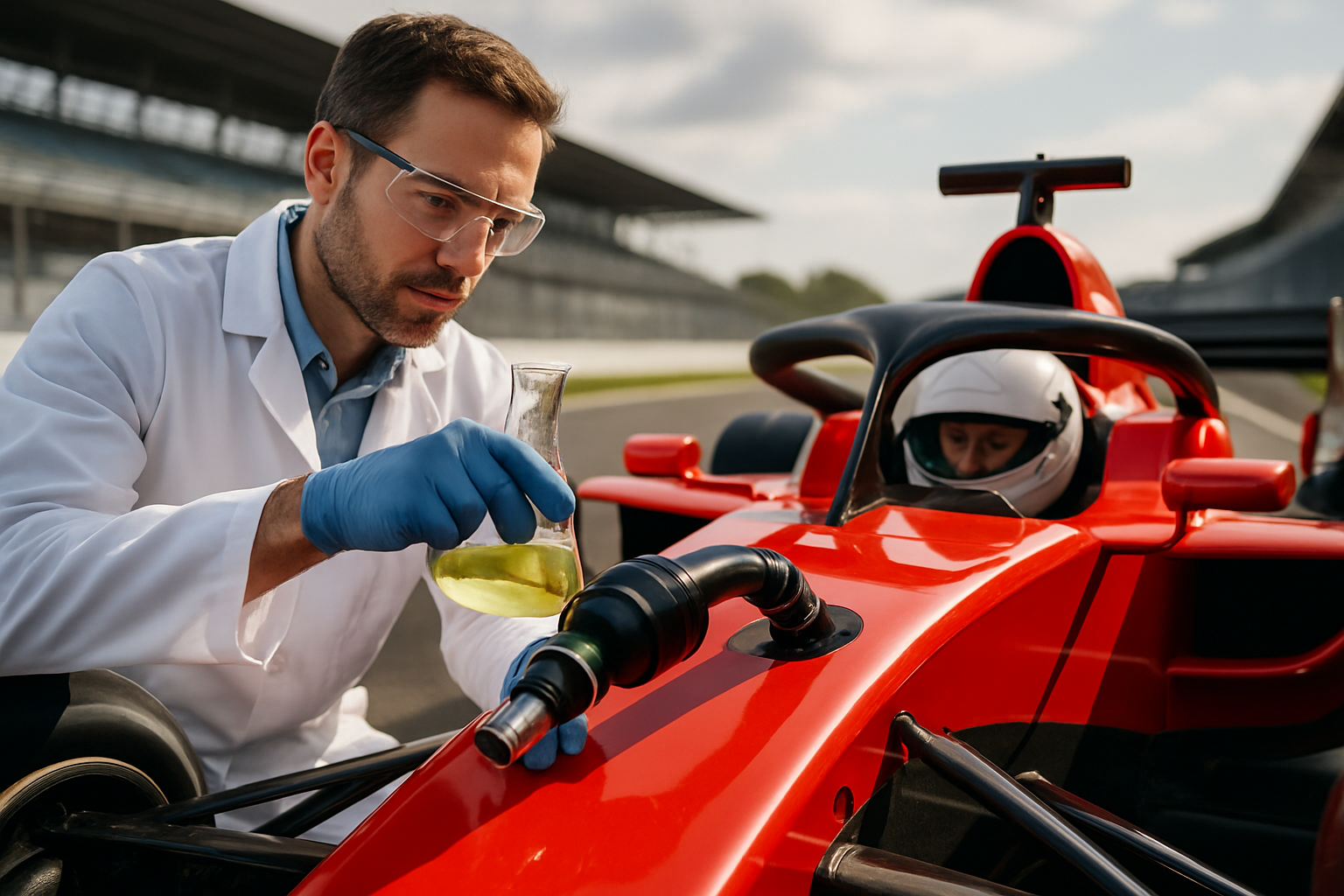Synthetic Fuels: The Future of Sustainable Motorsports
Imagine racing cars thundering down a track, their engines roaring with power, yet leaving behind a minimal carbon footprint. This isn't a scene from a distant future; it's the promise of synthetic fuels in motorsports. As the automotive world grapples with environmental concerns, synthetic fuels are emerging as a potential game-changer, offering a way to preserve the thrill of racing while drastically reducing emissions.

The Science Behind Synthetic Fuels
Synthetic fuels, also known as e-fuels or power-to-liquid fuels, are created through a complex process that combines hydrogen and carbon dioxide. The hydrogen is typically produced through electrolysis of water, powered by renewable energy sources like wind or solar. This hydrogen is then combined with carbon dioxide, often captured from industrial processes or directly from the air, in a process called Fischer-Tropsch synthesis. The result is a liquid fuel that’s chemically similar to gasoline or diesel but with a significantly lower carbon footprint.
One of the key advantages of synthetic fuels is their compatibility with existing internal combustion engines. This means that current race cars can use these fuels with little to no modification, allowing for a smoother transition to more sustainable practices. Moreover, synthetic fuels can be tailored to meet specific performance requirements, potentially offering even better power and efficiency than traditional fossil fuels.
Synthetic Fuels in Action: Early Adopters in Motorsports
Several racing series have already begun experimenting with synthetic fuels. Formula 1, known for its cutting-edge technology, has announced plans to introduce 100% sustainable fuels by 2026. The World Endurance Championship, home to the legendary 24 Hours of Le Mans, has also embraced synthetic fuels as part of its sustainability strategy.
Porsche, a name synonymous with motorsports excellence, has been at the forefront of synthetic fuel development. The German manufacturer has invested heavily in e-fuel technology, even building a pilot plant in Chile to produce synthetic fuels for use in its racing programs. This real-world application provides valuable data and helps refine the technology for wider adoption.
Environmental Impact and Sustainability
The environmental benefits of synthetic fuels are significant. While they do release carbon dioxide when burned, the production process can be carbon-neutral or even carbon-negative if the CO2 used in fuel creation is captured from the atmosphere. This closed carbon cycle could potentially allow motorsports to continue using internal combustion engines without contributing to net carbon emissions.
However, it’s important to note that the production of synthetic fuels is currently energy-intensive and expensive. For synthetic fuels to be truly sustainable, the entire production process must be powered by renewable energy sources. As renewable energy technology improves and becomes more widespread, the environmental credentials of synthetic fuels are likely to strengthen further.
Technical Challenges and Performance Considerations
While synthetic fuels offer promising environmental benefits, they also present unique technical challenges. Engineers must ensure that these new fuels deliver the same or better performance than traditional fuels. This includes factors like energy density, combustion characteristics, and compatibility with existing engine designs.
Early tests have shown promising results. Some synthetic fuels have demonstrated higher octane ratings than conventional gasoline, potentially allowing for increased engine compression ratios and improved efficiency. However, fine-tuning fuel formulations to meet the extreme demands of motorsports remains an ongoing process.
Another consideration is the impact of synthetic fuels on engine longevity and maintenance. As with any new technology, extensive testing is required to understand how these fuels affect engine components over time. This is particularly crucial in endurance racing, where reliability is paramount.
Economic Implications and Industry Adoption
The adoption of synthetic fuels in motorsports could have far-reaching economic implications. Currently, the production costs of synthetic fuels are significantly higher than those of fossil fuels. However, as technology improves and production scales up, these costs are expected to decrease.
For racing teams and manufacturers, the switch to synthetic fuels may require initial investments in research and development. However, it also presents opportunities for innovation and technological leadership. Companies that successfully develop and implement synthetic fuel technologies in motorsports may gain a competitive advantage in the broader automotive market.
Moreover, the motorsports industry’s embrace of synthetic fuels could accelerate their development and adoption in consumer vehicles. This could create new business opportunities and potentially reshape the automotive fuel industry.
The Road Ahead: Challenges and Opportunities
As promising as synthetic fuels are, their widespread adoption in motorsports faces several challenges. Scale is a significant issue; current production capabilities are limited, and ramping up to meet the demands of major racing series will require substantial investment and time.
Regulatory frameworks also need to catch up with this emerging technology. Racing governing bodies will need to develop new standards and regulations for synthetic fuels, ensuring fair competition and safety.
Despite these challenges, the potential benefits of synthetic fuels make them an exciting prospect for the future of motorsports. They offer a way to preserve the heritage and excitement of internal combustion engine racing while aligning with global sustainability goals. As technology advances and costs decrease, we may see synthetic fuels become the norm not just in racing, but in everyday transportation as well.
The journey towards sustainable motorsports is just beginning, and synthetic fuels are poised to play a crucial role in this transformation. As racing series, teams, and manufacturers continue to innovate and experiment with this technology, we can look forward to a future where the roar of engines and the thrill of speed coexist harmoniously with environmental responsibility.




